2023届高三英语二轮复习:副词用法精讲课件(42张)
文档属性
| 名称 | 2023届高三英语二轮复习:副词用法精讲课件(42张) |  | |
| 格式 | pptx | ||
| 文件大小 | 203.0KB | ||
| 资源类型 | 教案 | ||
| 版本资源 | 通用版 | ||
| 科目 | 英语 | ||
| 更新时间 | 2022-10-03 19:57:34 | ||
图片预览

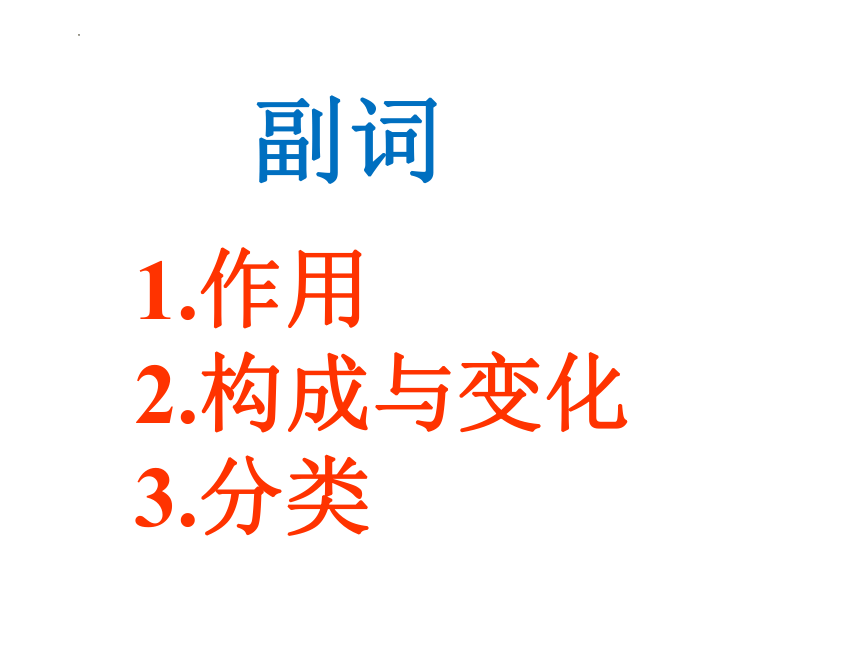
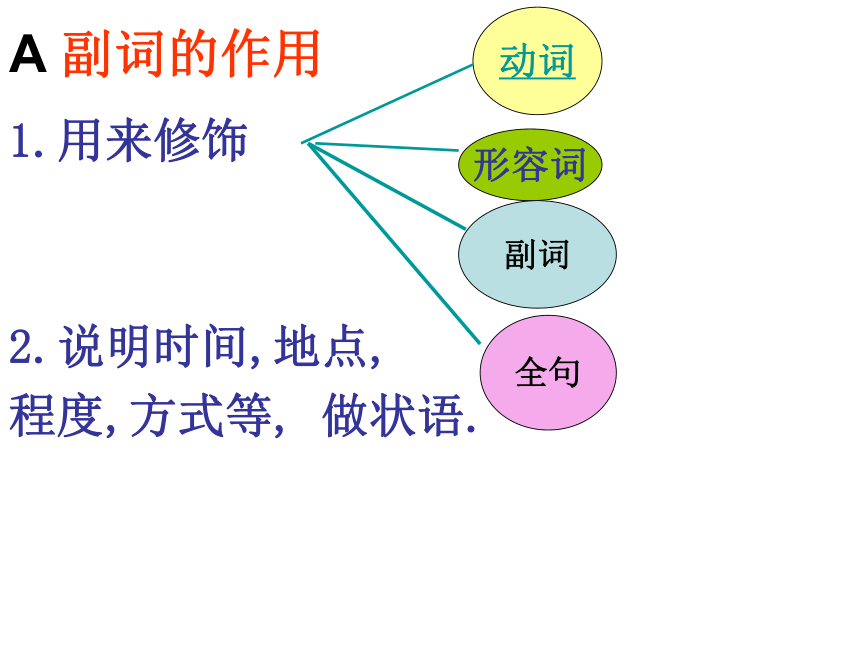
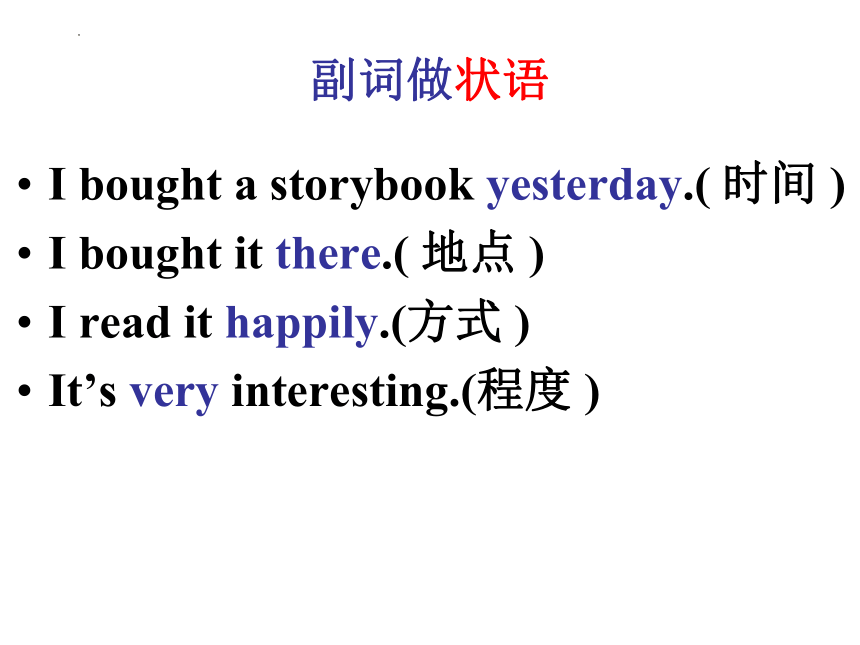
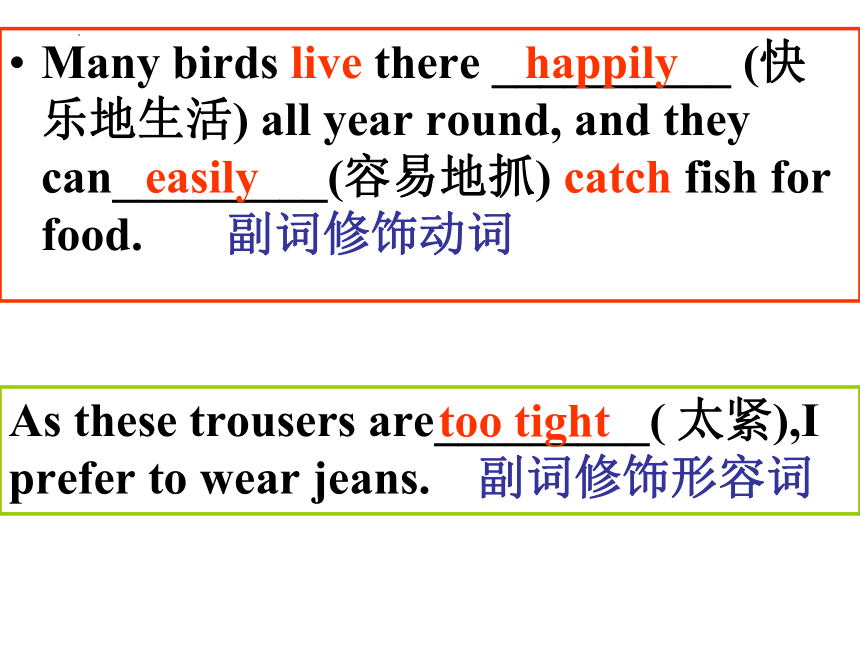
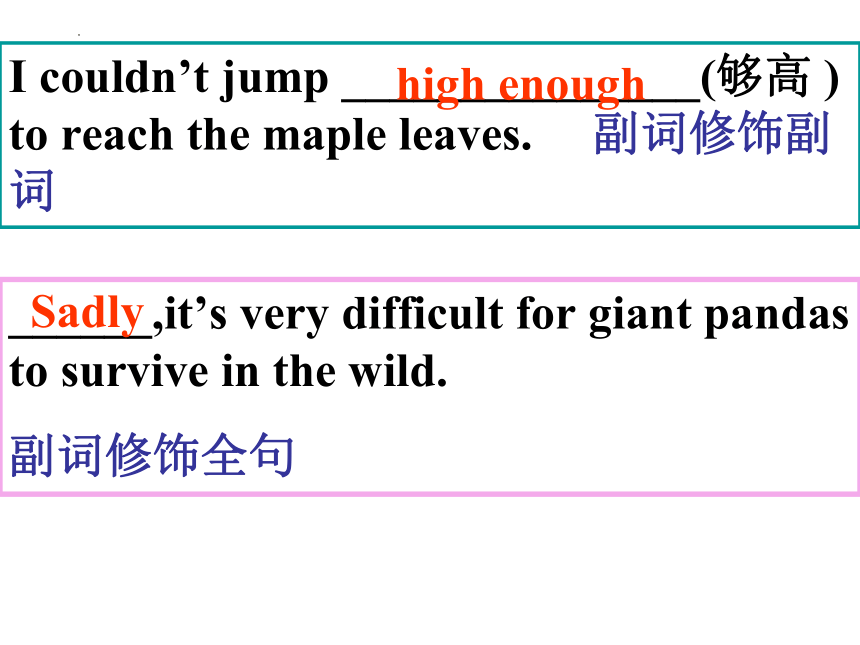
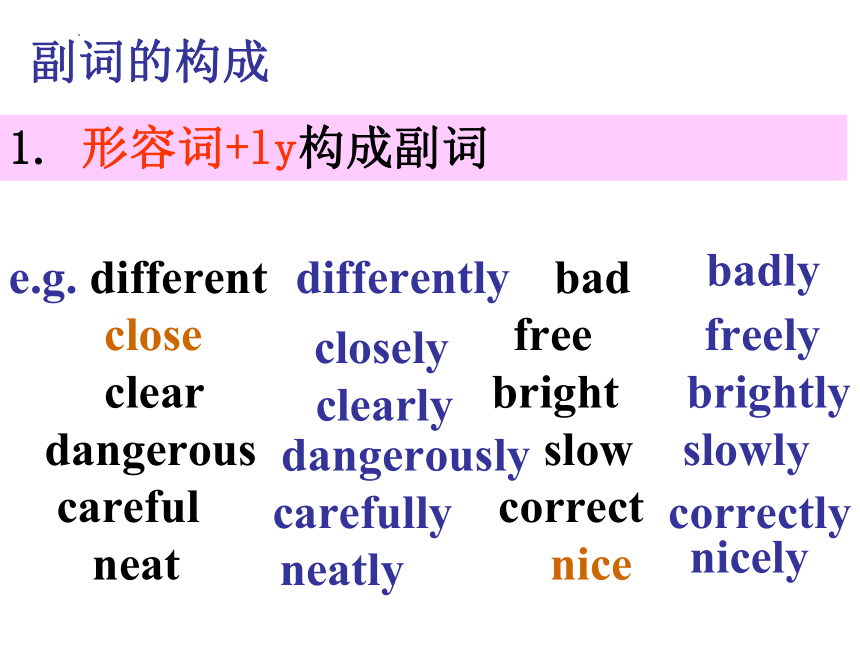
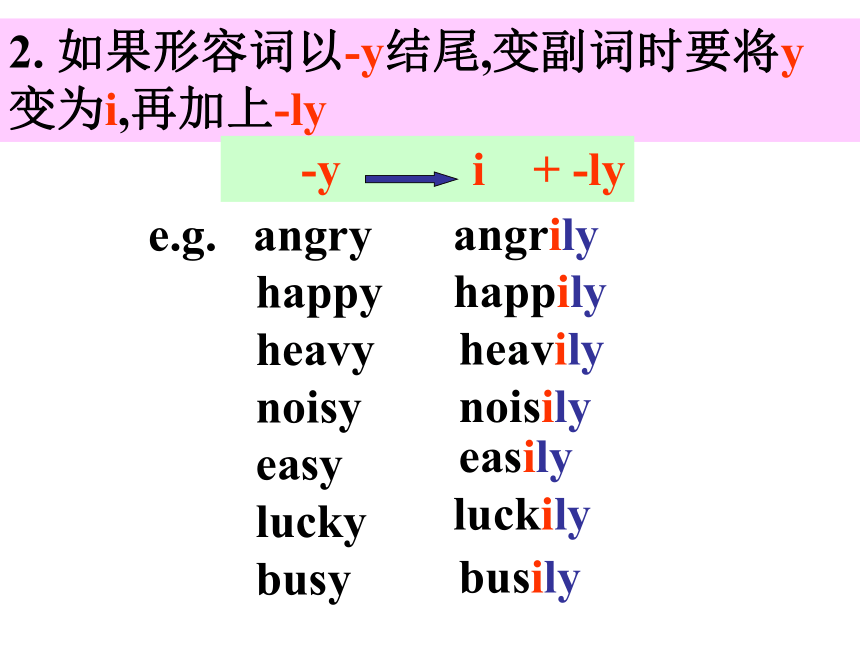
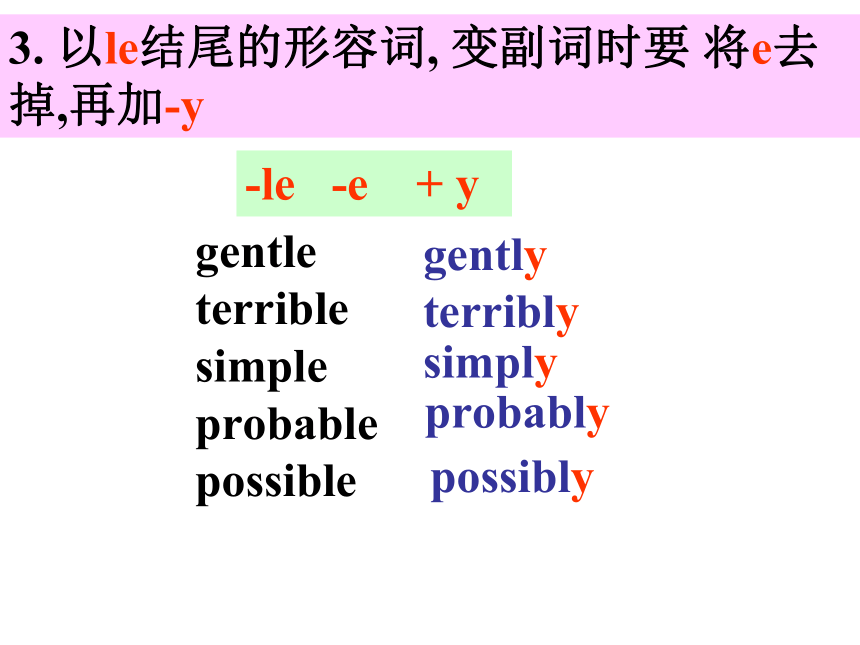
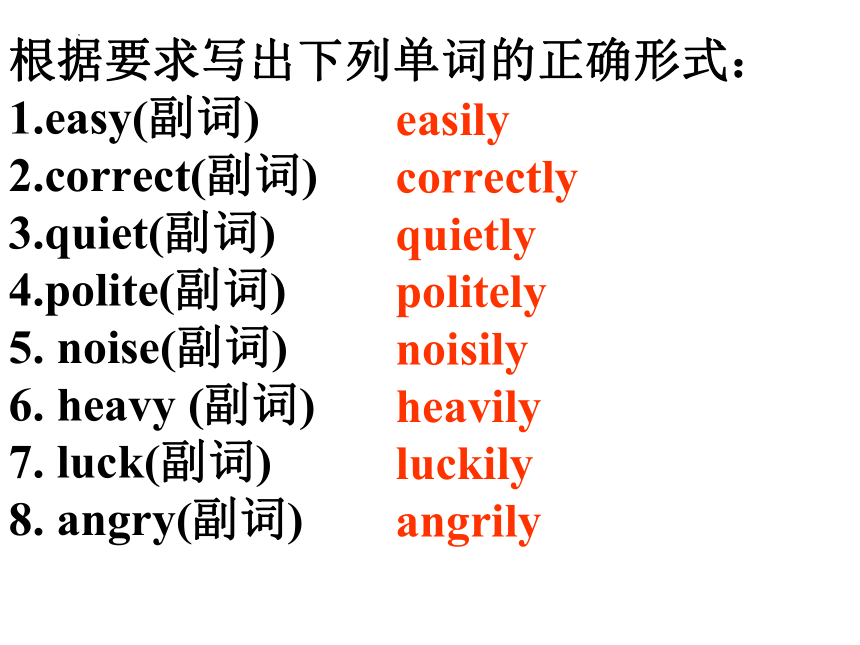
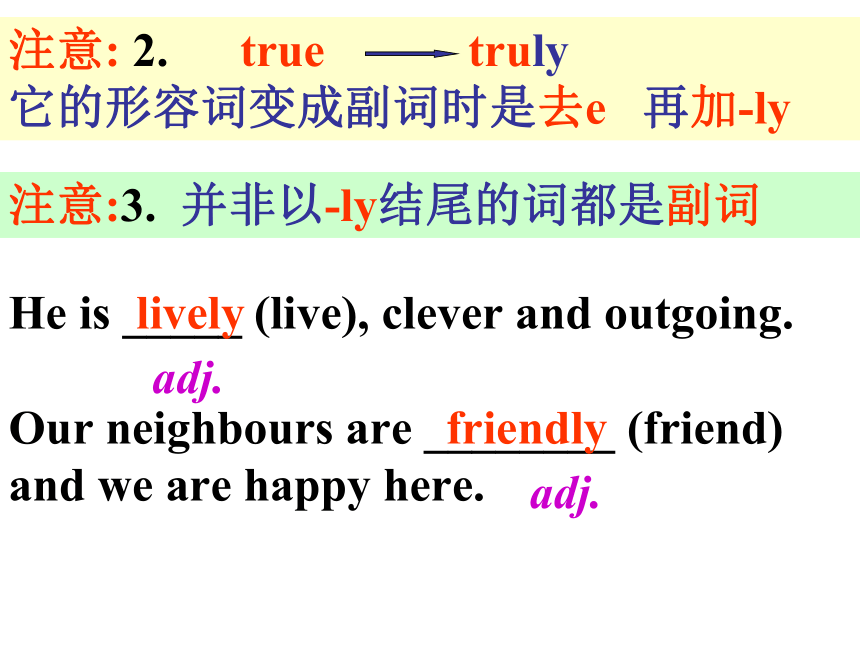
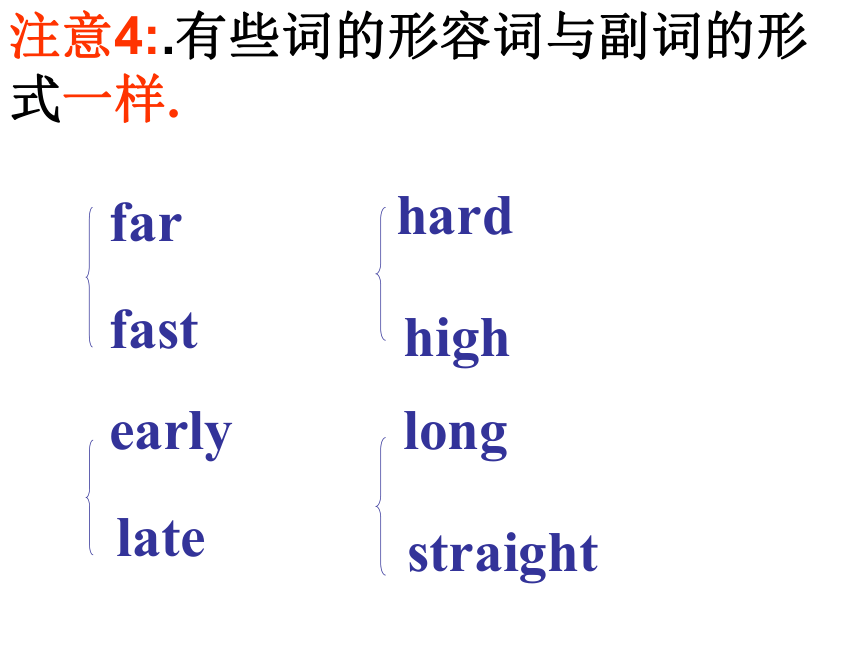
文档简介
(共42张PPT)
English Adverbs
副词
副词
1.作用
2.构成与变化
3.分类
A 副词的作用
1.用来修饰
2.说明时间,地点,
程度,方式等, 做状语.
动词
形容词
全句
副词
副词做状语
I bought a storybook yesterday.( 时间 )
I bought it there.( 地点 )
I read it happily.(方式 )
It’s very interesting.(程度 )
Many birds live there __________ (快乐地生活) all year round, and they can_________(容易地抓) catch fish for food. 副词修饰动词
happily
easily
As these trousers are_________( 太紧),I prefer to wear jeans. 副词修饰形容词
too tight
I couldn’t jump _______________(够高 ) to reach the maple leaves. 副词修饰副词
high enough
______,it’s very difficult for giant pandas to survive in the wild.
副词修饰全句
Sadly
副词的构成
1. 形容词+ly构成副词
e.g. different bad
close free
clear bright
dangerous slow
careful correct
neat nice
differently
closely
clearly
dangerously
carefully
neatly
badly
freely
brightly
slowly
correctly
nicely
2. 如果形容词以-y结尾,变副词时要将y变为i,再加上-ly
e.g. angry
happy
heavy
noisy
easy
lucky
busy
angrily
happily
heavily
noisily
easily
luckily
busily
-y i + -ly
gentle
terrible
simple
probable
possible
gently
terribly
simply
probably
possibly
3. 以le结尾的形容词, 变副词时要 将e去掉,再加-y
-le -e + y
根据要求写出下列单词的正确形式:
easy(副词)
correct(副词)
quiet(副词)
polite(副词)
5. noise(副词)
6. heavy (副词)
7. luck(副词)
8. angry(副词)
easily
correctly
quietly
politely
noisily
heavily
luckily
angrily
He is _____ (live), clever and outgoing.
Our neighbours are ________ (friend) and we are happy here.
lively
friendly
注意:3. 并非以-ly结尾的词都是副词
adj.
adj.
注意: 2. true truly
它的形容词变成副词时是去e 再加-ly
far
early
late
straight
hard
注意4:.有些词的形容词与副词的形式一样.
fast
high
long
1. 顺序副词
Millie usually gets up at 6pm.
.
First, she brushes her teeth.
Then, she washes her face.
Next, she has breakfast.
Afterwards, she takes a bus.
Finally, she gets to school and has lessons.
2. 频率副词
always
usually
often
sometimes
seldom
never
frequency adverb 频率副词
--_________do you play the piano
-- Never.
How often
对他们提问要用How often(多长时间一次)
eg.He always shares everything with others.
They seldom dance because they don’t like dancing.
3. 方式副词
She speaks English ________. (fluent)
He drives very ________.(careful)
fluently
carefully
我们用方式副词来说明某事件或情景发生的方式。
She dances beautifully.
________ does she dance
How
我们用方式副词来回答以how开头的特殊疑问句。
4. 语气副词:
so, such, very, quite, rather, too, enough…
The bag is so heavy. I can’t carry it.
= It is ____________ bag. I can’t carry it.
such a heavy
区别几组易混淆的副词、形容词
★ already 常用于肯定句
yet 常用于否定句、疑问句
* The train has already gone.
* They haven’t come back yet.
★ such 修饰名词 so 修饰形容词、副词 *I have never seen such a fun film.
*This box is so heavy that I can’t carry it.
★ alone(单独、独自)作表语=by oneself
lonely(孤独的)可作表语、定语
* He lived alone, but he didn’t feel lonely.
* It’s a lonely village.
★ hard(努力地)
hardly(几乎不)否定副词
* She works very hard, and he hardly has a rest on Sundays.
The Comparative & Superlative Degrees of Adjectives & Adverbs
形容词和副词
比较级和最高级的构成
规则变化
单音节词和少数双音节词
1) 一般情况加 – er 或 – est
fast – faster – fastest
high – higher – highest
clever – cleverer – cleverest
2) 以字母 e 结尾加 –r 或 –st
fine – finer – finest
late – later – latest
nice – nicer – nicest
3) 重读闭音节、末尾只有一个辅音
字母时双写加 –er 或 –est
fat – fatter – fattest
big – bigger – biggest
thin – thinner – thinnest
4) 以辅音字母加 y 结尾变 y
为 i 加 –er 或 –est
early – earlier – earliest
easy – easier – easiest
lucky – luckier – luckiest
不规则变化
good/well – better – best
many/much – more – most
little – less – least
far – farther – farthest
( far – further – furthest )
bad/badly/ill – worse – worst
形容词和副词
比较级和最高级的用法
1)表示两者(人或事物)的比较时用比较级,通常用连词 than 引导,表示“较······”或“更······一些”的意思
*This cake is more delicious than that one.
*Kim jumped farther than Jim (did).
2) 表示三者或三者以上(人或事物)的比较用最高级,最高级的前面一般要加定冠词the,后面可带of(in,among)短语来说明比较的范围
*Shanghai is the biggest city in China.
*Lucy sings (the) best of all.
*He is the most careful among us.
3) 在表示 “和······一样······” 和 “不及······” 这类概念时,可以用 “as+原级+as” 和 “not as(so)+原级+as”的句型
*Our teacher is as busy as before.
*He does not run so (as) fast as I.
4)几种比较级的使用句型
1.“ 比较级 + and + 比较级 ”
表示“ 越来越······ ”
*Your English is getting better and better.
*These days more and more people are learning English.
2. “the + 比较级,the + 比较级”
表示“ 越······就越······ ”
*The more, the better.
*The busier he is, the happier he feels.
注意1:可用much, still, a little, even, far, a lot等来修饰比较级
*She is much taller than Mrs.Liu.
This problem is a little more difficult than the other one.
注意2:形容词最高级前一定要用the,副词最高级前可省略
注意3:在比较级中为了避免重复,在the后常用one,that,those等词来替代前面提到过的名词
*This pen is shorter than that one.
The weather here is warmer than that of Shanghai.
注意4:注意同类事物进行比较:
e.g.
She is slimmer than me.
Her hair is longer than mine.
注意5:掌握几种同义句转换
1. He is taller than any other student in his class.
= He is taller than the other students in his class.
= He is the tallest (student) in his class.
注意6:用于形容词原形前的程度副词有:
too, so, very, quite, rather…e.g.
This book is very interesting.
一、选择
( )1 Who gets home usually ____ in your family
A. the latest B. later
C. early D. as late
( )2 The more we looked at the picture, ____.
A. we like it less B. the less we liked it
C. better we liked it D. it looked better
( )3 What a pity. Lucy ran ____ than Lily.
A. a few more slowly B. a little more slowly
C. much more slowly D. little slowlier
A
B
B
巩固练习
二、用词的适当形式填空
1 He works very __________. He __________ has a rest on Sunday. (hard)
2 __________, he didn’t fail the exam.(luck)
3 He was so __________ that he couldn’t believe this __________ news. (surprise)
4 He won’t do it. I won’t do it, __________. (too)
hard
hardly
Luckily
surprised
surprising
either
5 Mr. Green is feeling __________ enough to go to work. (good)
6 The old man looks very _______________ than you think. (friend)
7 This box is not so ______ as that one. (heavy)
8 Lucy jumped __________ of the four. (high)
well
more friendly
heavy
highest
English Adverbs
副词
副词
1.作用
2.构成与变化
3.分类
A 副词的作用
1.用来修饰
2.说明时间,地点,
程度,方式等, 做状语.
动词
形容词
全句
副词
副词做状语
I bought a storybook yesterday.( 时间 )
I bought it there.( 地点 )
I read it happily.(方式 )
It’s very interesting.(程度 )
Many birds live there __________ (快乐地生活) all year round, and they can_________(容易地抓) catch fish for food. 副词修饰动词
happily
easily
As these trousers are_________( 太紧),I prefer to wear jeans. 副词修饰形容词
too tight
I couldn’t jump _______________(够高 ) to reach the maple leaves. 副词修饰副词
high enough
______,it’s very difficult for giant pandas to survive in the wild.
副词修饰全句
Sadly
副词的构成
1. 形容词+ly构成副词
e.g. different bad
close free
clear bright
dangerous slow
careful correct
neat nice
differently
closely
clearly
dangerously
carefully
neatly
badly
freely
brightly
slowly
correctly
nicely
2. 如果形容词以-y结尾,变副词时要将y变为i,再加上-ly
e.g. angry
happy
heavy
noisy
easy
lucky
busy
angrily
happily
heavily
noisily
easily
luckily
busily
-y i + -ly
gentle
terrible
simple
probable
possible
gently
terribly
simply
probably
possibly
3. 以le结尾的形容词, 变副词时要 将e去掉,再加-y
-le -e + y
根据要求写出下列单词的正确形式:
easy(副词)
correct(副词)
quiet(副词)
polite(副词)
5. noise(副词)
6. heavy (副词)
7. luck(副词)
8. angry(副词)
easily
correctly
quietly
politely
noisily
heavily
luckily
angrily
He is _____ (live), clever and outgoing.
Our neighbours are ________ (friend) and we are happy here.
lively
friendly
注意:3. 并非以-ly结尾的词都是副词
adj.
adj.
注意: 2. true truly
它的形容词变成副词时是去e 再加-ly
far
early
late
straight
hard
注意4:.有些词的形容词与副词的形式一样.
fast
high
long
1. 顺序副词
Millie usually gets up at 6pm.
.
First, she brushes her teeth.
Then, she washes her face.
Next, she has breakfast.
Afterwards, she takes a bus.
Finally, she gets to school and has lessons.
2. 频率副词
always
usually
often
sometimes
seldom
never
frequency adverb 频率副词
--_________do you play the piano
-- Never.
How often
对他们提问要用How often(多长时间一次)
eg.He always shares everything with others.
They seldom dance because they don’t like dancing.
3. 方式副词
She speaks English ________. (fluent)
He drives very ________.(careful)
fluently
carefully
我们用方式副词来说明某事件或情景发生的方式。
She dances beautifully.
________ does she dance
How
我们用方式副词来回答以how开头的特殊疑问句。
4. 语气副词:
so, such, very, quite, rather, too, enough…
The bag is so heavy. I can’t carry it.
= It is ____________ bag. I can’t carry it.
such a heavy
区别几组易混淆的副词、形容词
★ already 常用于肯定句
yet 常用于否定句、疑问句
* The train has already gone.
* They haven’t come back yet.
★ such 修饰名词 so 修饰形容词、副词 *I have never seen such a fun film.
*This box is so heavy that I can’t carry it.
★ alone(单独、独自)作表语=by oneself
lonely(孤独的)可作表语、定语
* He lived alone, but he didn’t feel lonely.
* It’s a lonely village.
★ hard(努力地)
hardly(几乎不)否定副词
* She works very hard, and he hardly has a rest on Sundays.
The Comparative & Superlative Degrees of Adjectives & Adverbs
形容词和副词
比较级和最高级的构成
规则变化
单音节词和少数双音节词
1) 一般情况加 – er 或 – est
fast – faster – fastest
high – higher – highest
clever – cleverer – cleverest
2) 以字母 e 结尾加 –r 或 –st
fine – finer – finest
late – later – latest
nice – nicer – nicest
3) 重读闭音节、末尾只有一个辅音
字母时双写加 –er 或 –est
fat – fatter – fattest
big – bigger – biggest
thin – thinner – thinnest
4) 以辅音字母加 y 结尾变 y
为 i 加 –er 或 –est
early – earlier – earliest
easy – easier – easiest
lucky – luckier – luckiest
不规则变化
good/well – better – best
many/much – more – most
little – less – least
far – farther – farthest
( far – further – furthest )
bad/badly/ill – worse – worst
形容词和副词
比较级和最高级的用法
1)表示两者(人或事物)的比较时用比较级,通常用连词 than 引导,表示“较······”或“更······一些”的意思
*This cake is more delicious than that one.
*Kim jumped farther than Jim (did).
2) 表示三者或三者以上(人或事物)的比较用最高级,最高级的前面一般要加定冠词the,后面可带of(in,among)短语来说明比较的范围
*Shanghai is the biggest city in China.
*Lucy sings (the) best of all.
*He is the most careful among us.
3) 在表示 “和······一样······” 和 “不及······” 这类概念时,可以用 “as+原级+as” 和 “not as(so)+原级+as”的句型
*Our teacher is as busy as before.
*He does not run so (as) fast as I.
4)几种比较级的使用句型
1.“ 比较级 + and + 比较级 ”
表示“ 越来越······ ”
*Your English is getting better and better.
*These days more and more people are learning English.
2. “the + 比较级,the + 比较级”
表示“ 越······就越······ ”
*The more, the better.
*The busier he is, the happier he feels.
注意1:可用much, still, a little, even, far, a lot等来修饰比较级
*She is much taller than Mrs.Liu.
This problem is a little more difficult than the other one.
注意2:形容词最高级前一定要用the,副词最高级前可省略
注意3:在比较级中为了避免重复,在the后常用one,that,those等词来替代前面提到过的名词
*This pen is shorter than that one.
The weather here is warmer than that of Shanghai.
注意4:注意同类事物进行比较:
e.g.
She is slimmer than me.
Her hair is longer than mine.
注意5:掌握几种同义句转换
1. He is taller than any other student in his class.
= He is taller than the other students in his class.
= He is the tallest (student) in his class.
注意6:用于形容词原形前的程度副词有:
too, so, very, quite, rather…e.g.
This book is very interesting.
一、选择
( )1 Who gets home usually ____ in your family
A. the latest B. later
C. early D. as late
( )2 The more we looked at the picture, ____.
A. we like it less B. the less we liked it
C. better we liked it D. it looked better
( )3 What a pity. Lucy ran ____ than Lily.
A. a few more slowly B. a little more slowly
C. much more slowly D. little slowlier
A
B
B
巩固练习
二、用词的适当形式填空
1 He works very __________. He __________ has a rest on Sunday. (hard)
2 __________, he didn’t fail the exam.(luck)
3 He was so __________ that he couldn’t believe this __________ news. (surprise)
4 He won’t do it. I won’t do it, __________. (too)
hard
hardly
Luckily
surprised
surprising
either
5 Mr. Green is feeling __________ enough to go to work. (good)
6 The old man looks very _______________ than you think. (friend)
7 This box is not so ______ as that one. (heavy)
8 Lucy jumped __________ of the four. (high)
well
more friendly
heavy
highest
